Safeguarding Vulnerable Adults in Care
VerifiedAdded on 2020/06/04
|9
|1942
|61
AI Summary
This assignment focuses on the crucial topic of safeguarding vulnerable adults within care homes. It highlights the need for special attention, care, and understanding when dealing with this population. The assignment emphasizes that legislation has been implemented to protect these individuals and discusses how a lack of communication and understanding can lead to conflicts and hinder proper treatment. It encourages best practices in safeguarding and explores the challenges multi-agency settings face in ensuring the well-being of vulnerable adults.
Contribute Materials
Your contribution can guide someone’s learning journey. Share your
documents today.
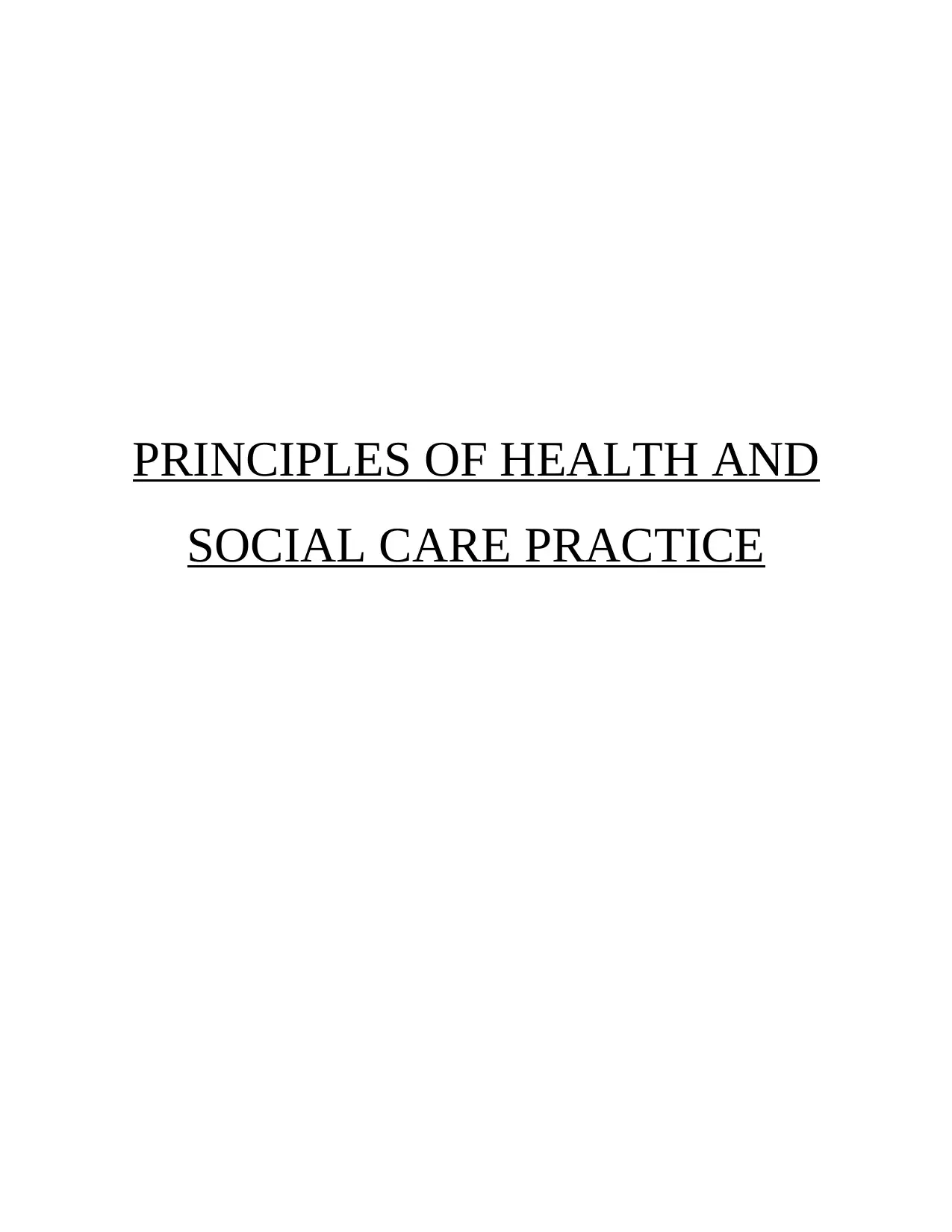
PRINCIPLES OF HEALTH AND
SOCIAL CARE PRACTICE
SOCIAL CARE PRACTICE
Secure Best Marks with AI Grader
Need help grading? Try our AI Grader for instant feedback on your assignments.
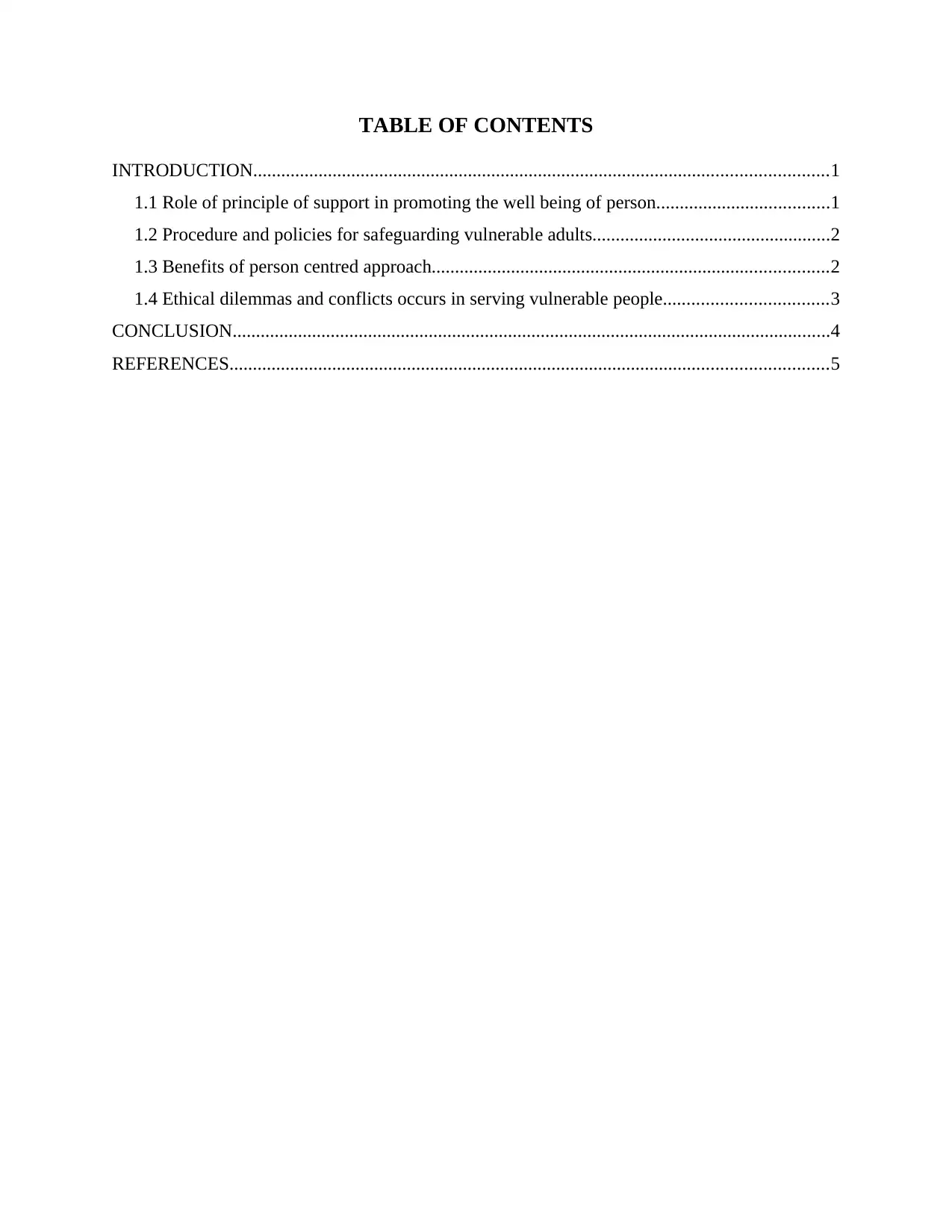
TABLE OF CONTENTS
INTRODUCTION...........................................................................................................................1
1.1 Role of principle of support in promoting the well being of person.....................................1
1.2 Procedure and policies for safeguarding vulnerable adults...................................................2
1.3 Benefits of person centred approach.....................................................................................2
1.4 Ethical dilemmas and conflicts occurs in serving vulnerable people...................................3
CONCLUSION................................................................................................................................4
REFERENCES................................................................................................................................5
INTRODUCTION...........................................................................................................................1
1.1 Role of principle of support in promoting the well being of person.....................................1
1.2 Procedure and policies for safeguarding vulnerable adults...................................................2
1.3 Benefits of person centred approach.....................................................................................2
1.4 Ethical dilemmas and conflicts occurs in serving vulnerable people...................................3
CONCLUSION................................................................................................................................4
REFERENCES................................................................................................................................5
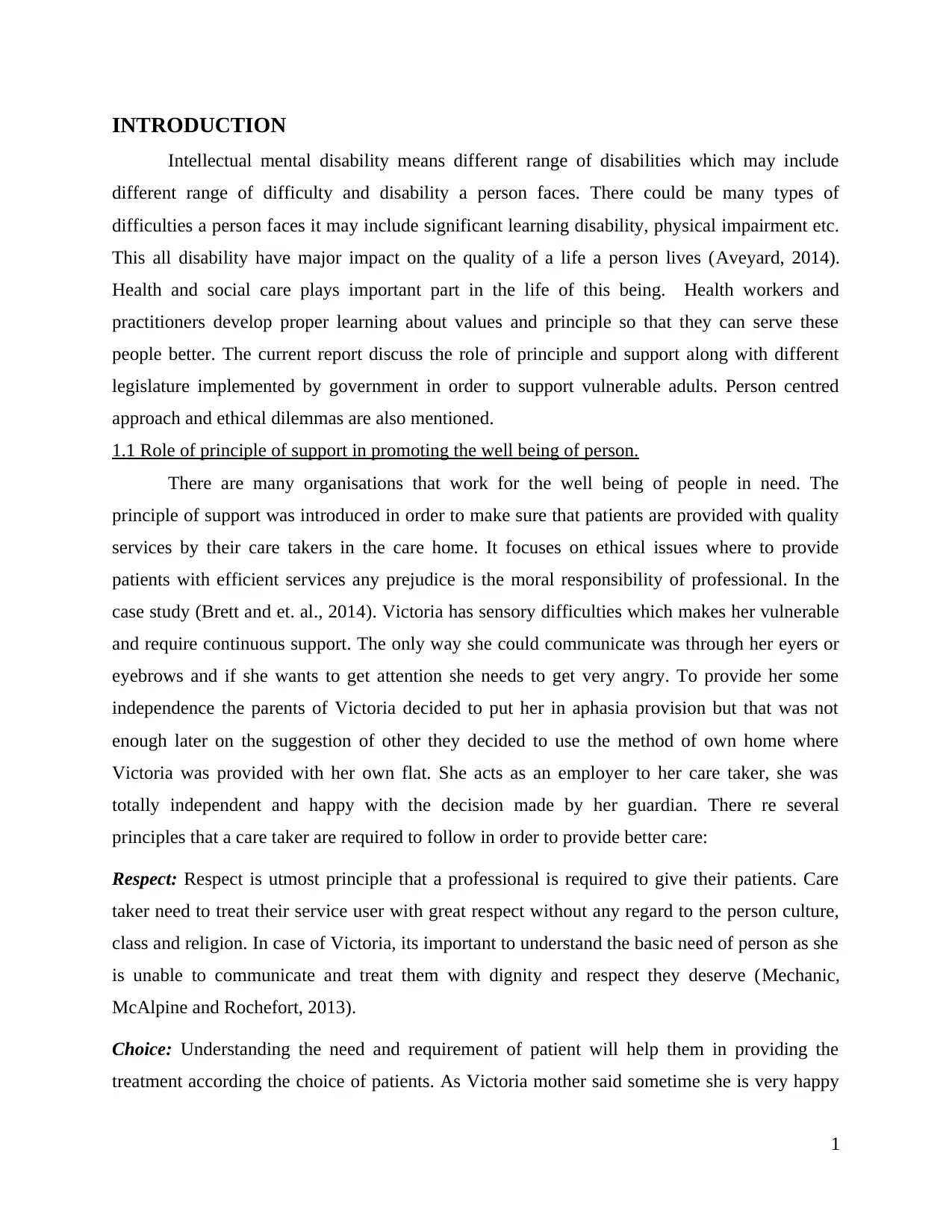
INTRODUCTION
Intellectual mental disability means different range of disabilities which may include
different range of difficulty and disability a person faces. There could be many types of
difficulties a person faces it may include significant learning disability, physical impairment etc.
This all disability have major impact on the quality of a life a person lives (Aveyard, 2014).
Health and social care plays important part in the life of this being. Health workers and
practitioners develop proper learning about values and principle so that they can serve these
people better. The current report discuss the role of principle and support along with different
legislature implemented by government in order to support vulnerable adults. Person centred
approach and ethical dilemmas are also mentioned.
1.1 Role of principle of support in promoting the well being of person.
There are many organisations that work for the well being of people in need. The
principle of support was introduced in order to make sure that patients are provided with quality
services by their care takers in the care home. It focuses on ethical issues where to provide
patients with efficient services any prejudice is the moral responsibility of professional. In the
case study (Brett and et. al., 2014). Victoria has sensory difficulties which makes her vulnerable
and require continuous support. The only way she could communicate was through her eyers or
eyebrows and if she wants to get attention she needs to get very angry. To provide her some
independence the parents of Victoria decided to put her in aphasia provision but that was not
enough later on the suggestion of other they decided to use the method of own home where
Victoria was provided with her own flat. She acts as an employer to her care taker, she was
totally independent and happy with the decision made by her guardian. There re several
principles that a care taker are required to follow in order to provide better care:
Respect: Respect is utmost principle that a professional is required to give their patients. Care
taker need to treat their service user with great respect without any regard to the person culture,
class and religion. In case of Victoria, its important to understand the basic need of person as she
is unable to communicate and treat them with dignity and respect they deserve (Mechanic,
McAlpine and Rochefort, 2013).
Choice: Understanding the need and requirement of patient will help them in providing the
treatment according the choice of patients. As Victoria mother said sometime she is very happy
1
Intellectual mental disability means different range of disabilities which may include
different range of difficulty and disability a person faces. There could be many types of
difficulties a person faces it may include significant learning disability, physical impairment etc.
This all disability have major impact on the quality of a life a person lives (Aveyard, 2014).
Health and social care plays important part in the life of this being. Health workers and
practitioners develop proper learning about values and principle so that they can serve these
people better. The current report discuss the role of principle and support along with different
legislature implemented by government in order to support vulnerable adults. Person centred
approach and ethical dilemmas are also mentioned.
1.1 Role of principle of support in promoting the well being of person.
There are many organisations that work for the well being of people in need. The
principle of support was introduced in order to make sure that patients are provided with quality
services by their care takers in the care home. It focuses on ethical issues where to provide
patients with efficient services any prejudice is the moral responsibility of professional. In the
case study (Brett and et. al., 2014). Victoria has sensory difficulties which makes her vulnerable
and require continuous support. The only way she could communicate was through her eyers or
eyebrows and if she wants to get attention she needs to get very angry. To provide her some
independence the parents of Victoria decided to put her in aphasia provision but that was not
enough later on the suggestion of other they decided to use the method of own home where
Victoria was provided with her own flat. She acts as an employer to her care taker, she was
totally independent and happy with the decision made by her guardian. There re several
principles that a care taker are required to follow in order to provide better care:
Respect: Respect is utmost principle that a professional is required to give their patients. Care
taker need to treat their service user with great respect without any regard to the person culture,
class and religion. In case of Victoria, its important to understand the basic need of person as she
is unable to communicate and treat them with dignity and respect they deserve (Mechanic,
McAlpine and Rochefort, 2013).
Choice: Understanding the need and requirement of patient will help them in providing the
treatment according the choice of patients. As Victoria mother said sometime she is very happy
1
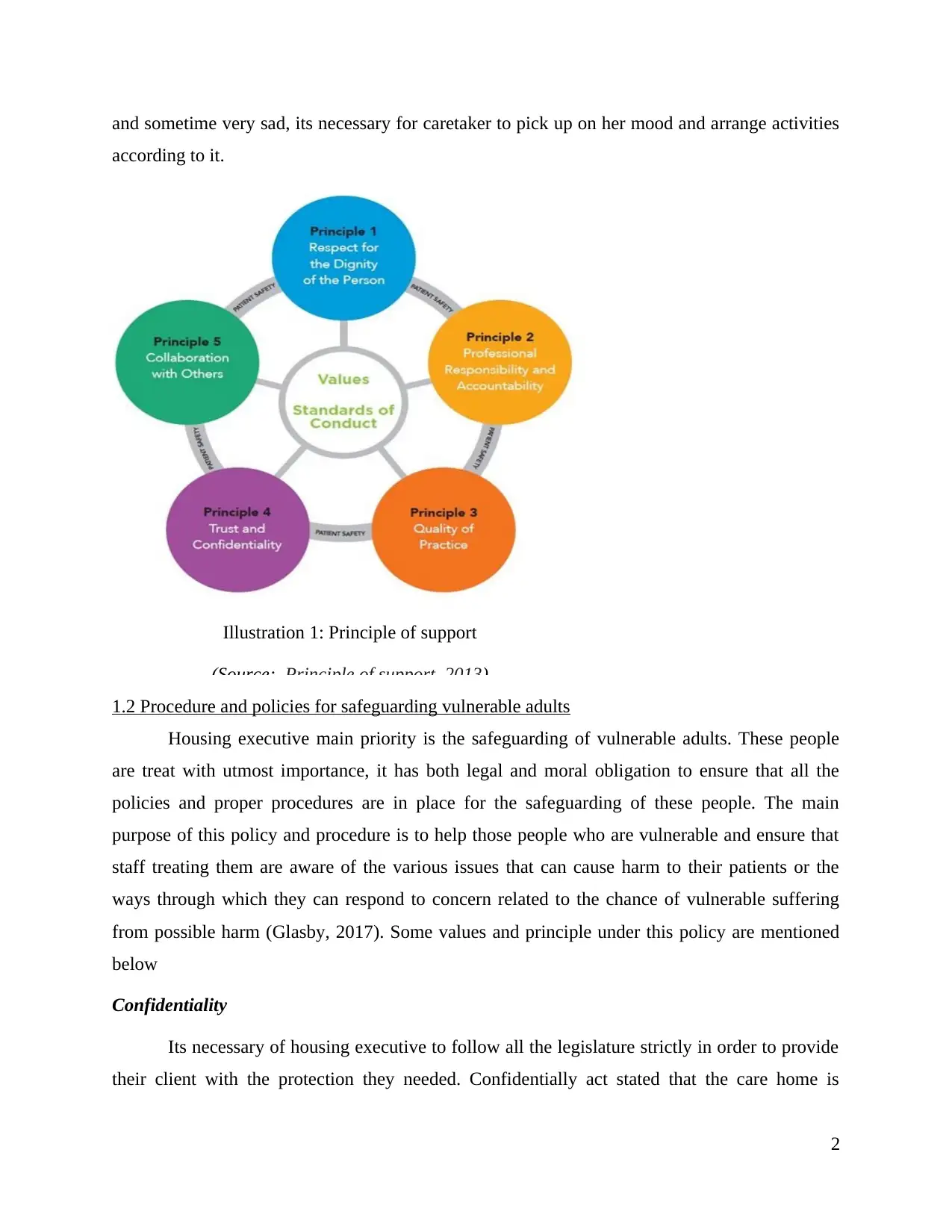
and sometime very sad, its necessary for caretaker to pick up on her mood and arrange activities
according to it.
Illustration 1: Principle of support
(Source: .Principle of support. 2013)
1.2 Procedure and policies for safeguarding vulnerable adults
Housing executive main priority is the safeguarding of vulnerable adults. These people
are treat with utmost importance, it has both legal and moral obligation to ensure that all the
policies and proper procedures are in place for the safeguarding of these people. The main
purpose of this policy and procedure is to help those people who are vulnerable and ensure that
staff treating them are aware of the various issues that can cause harm to their patients or the
ways through which they can respond to concern related to the chance of vulnerable suffering
from possible harm (Glasby, 2017). Some values and principle under this policy are mentioned
below
Confidentiality
Its necessary of housing executive to follow all the legislature strictly in order to provide
their client with the protection they needed. Confidentially act stated that the care home is
2
according to it.
Illustration 1: Principle of support
(Source: .Principle of support. 2013)
1.2 Procedure and policies for safeguarding vulnerable adults
Housing executive main priority is the safeguarding of vulnerable adults. These people
are treat with utmost importance, it has both legal and moral obligation to ensure that all the
policies and proper procedures are in place for the safeguarding of these people. The main
purpose of this policy and procedure is to help those people who are vulnerable and ensure that
staff treating them are aware of the various issues that can cause harm to their patients or the
ways through which they can respond to concern related to the chance of vulnerable suffering
from possible harm (Glasby, 2017). Some values and principle under this policy are mentioned
below
Confidentiality
Its necessary of housing executive to follow all the legislature strictly in order to provide
their client with the protection they needed. Confidentially act stated that the care home is
2
Secure Best Marks with AI Grader
Need help grading? Try our AI Grader for instant feedback on your assignments.
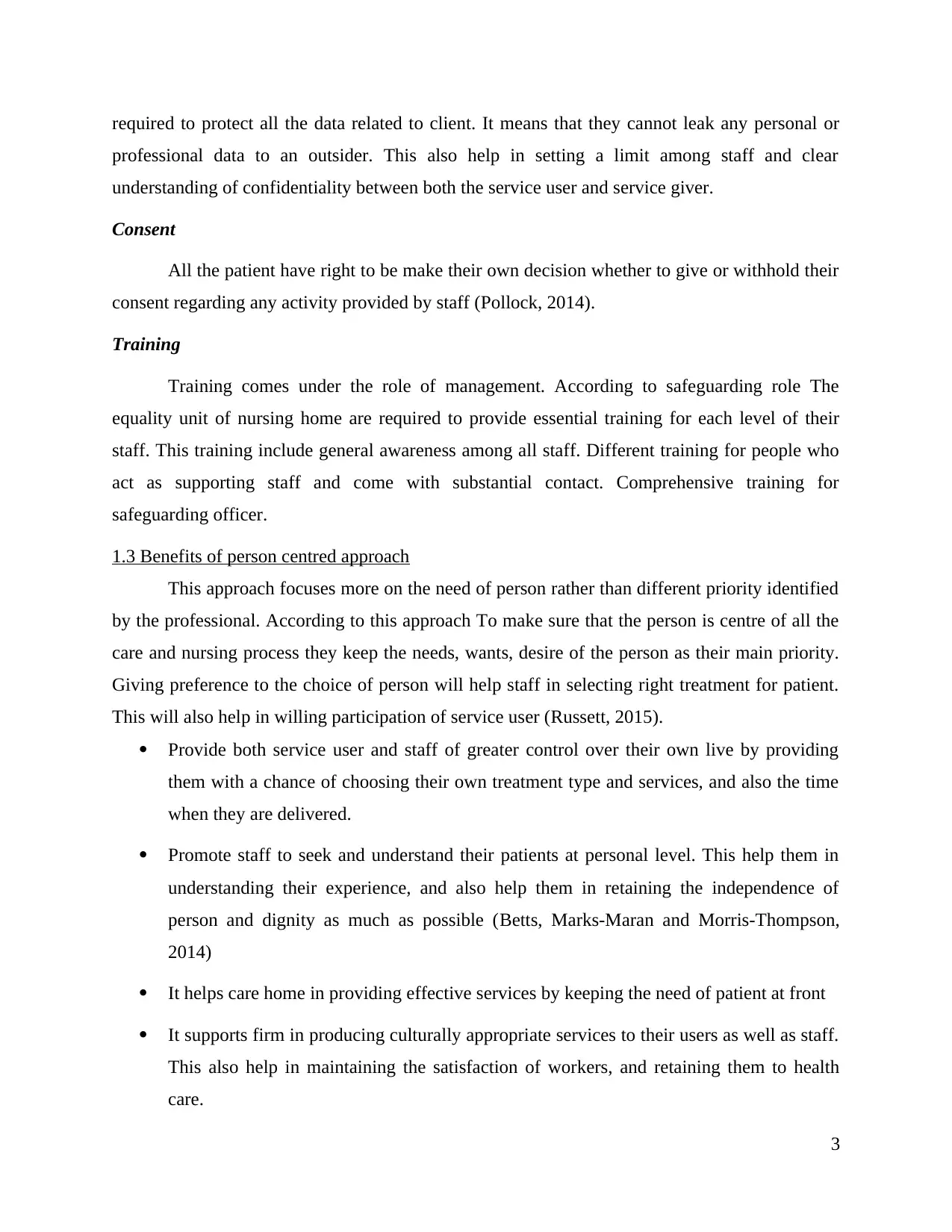
required to protect all the data related to client. It means that they cannot leak any personal or
professional data to an outsider. This also help in setting a limit among staff and clear
understanding of confidentiality between both the service user and service giver.
Consent
All the patient have right to be make their own decision whether to give or withhold their
consent regarding any activity provided by staff (Pollock, 2014).
Training
Training comes under the role of management. According to safeguarding role The
equality unit of nursing home are required to provide essential training for each level of their
staff. This training include general awareness among all staff. Different training for people who
act as supporting staff and come with substantial contact. Comprehensive training for
safeguarding officer.
1.3 Benefits of person centred approach
This approach focuses more on the need of person rather than different priority identified
by the professional. According to this approach To make sure that the person is centre of all the
care and nursing process they keep the needs, wants, desire of the person as their main priority.
Giving preference to the choice of person will help staff in selecting right treatment for patient.
This will also help in willing participation of service user (Russett, 2015).
Provide both service user and staff of greater control over their own live by providing
them with a chance of choosing their own treatment type and services, and also the time
when they are delivered.
Promote staff to seek and understand their patients at personal level. This help them in
understanding their experience, and also help them in retaining the independence of
person and dignity as much as possible (Betts, Marks-Maran and Morris-Thompson,
2014)
It helps care home in providing effective services by keeping the need of patient at front
It supports firm in producing culturally appropriate services to their users as well as staff.
This also help in maintaining the satisfaction of workers, and retaining them to health
care.
3
professional data to an outsider. This also help in setting a limit among staff and clear
understanding of confidentiality between both the service user and service giver.
Consent
All the patient have right to be make their own decision whether to give or withhold their
consent regarding any activity provided by staff (Pollock, 2014).
Training
Training comes under the role of management. According to safeguarding role The
equality unit of nursing home are required to provide essential training for each level of their
staff. This training include general awareness among all staff. Different training for people who
act as supporting staff and come with substantial contact. Comprehensive training for
safeguarding officer.
1.3 Benefits of person centred approach
This approach focuses more on the need of person rather than different priority identified
by the professional. According to this approach To make sure that the person is centre of all the
care and nursing process they keep the needs, wants, desire of the person as their main priority.
Giving preference to the choice of person will help staff in selecting right treatment for patient.
This will also help in willing participation of service user (Russett, 2015).
Provide both service user and staff of greater control over their own live by providing
them with a chance of choosing their own treatment type and services, and also the time
when they are delivered.
Promote staff to seek and understand their patients at personal level. This help them in
understanding their experience, and also help them in retaining the independence of
person and dignity as much as possible (Betts, Marks-Maran and Morris-Thompson,
2014)
It helps care home in providing effective services by keeping the need of patient at front
It supports firm in producing culturally appropriate services to their users as well as staff.
This also help in maintaining the satisfaction of workers, and retaining them to health
care.
3
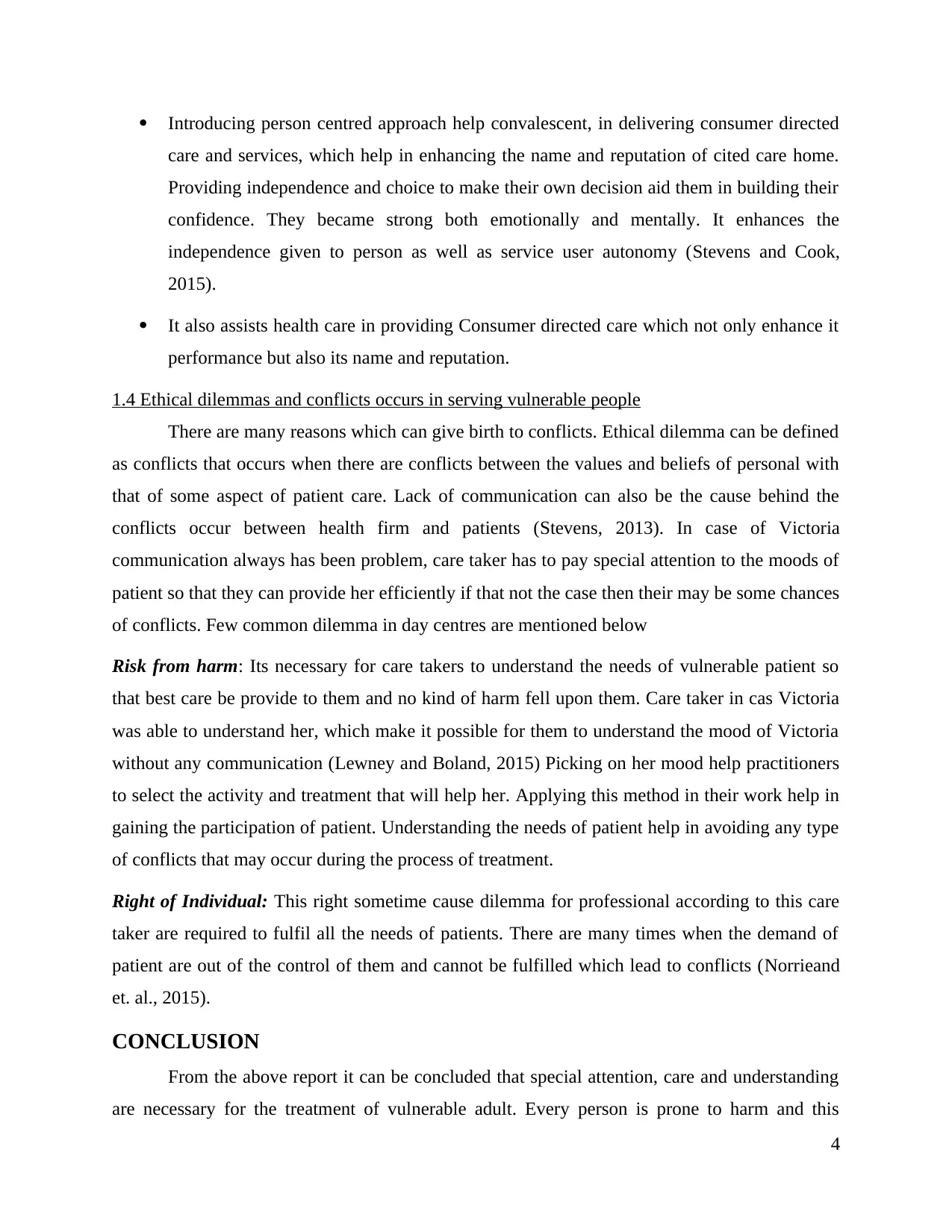
Introducing person centred approach help convalescent, in delivering consumer directed
care and services, which help in enhancing the name and reputation of cited care home.
Providing independence and choice to make their own decision aid them in building their
confidence. They became strong both emotionally and mentally. It enhances the
independence given to person as well as service user autonomy (Stevens and Cook,
2015).
It also assists health care in providing Consumer directed care which not only enhance it
performance but also its name and reputation.
1.4 Ethical dilemmas and conflicts occurs in serving vulnerable people
There are many reasons which can give birth to conflicts. Ethical dilemma can be defined
as conflicts that occurs when there are conflicts between the values and beliefs of personal with
that of some aspect of patient care. Lack of communication can also be the cause behind the
conflicts occur between health firm and patients (Stevens, 2013). In case of Victoria
communication always has been problem, care taker has to pay special attention to the moods of
patient so that they can provide her efficiently if that not the case then their may be some chances
of conflicts. Few common dilemma in day centres are mentioned below
Risk from harm: Its necessary for care takers to understand the needs of vulnerable patient so
that best care be provide to them and no kind of harm fell upon them. Care taker in cas Victoria
was able to understand her, which make it possible for them to understand the mood of Victoria
without any communication (Lewney and Boland, 2015) Picking on her mood help practitioners
to select the activity and treatment that will help her. Applying this method in their work help in
gaining the participation of patient. Understanding the needs of patient help in avoiding any type
of conflicts that may occur during the process of treatment.
Right of Individual: This right sometime cause dilemma for professional according to this care
taker are required to fulfil all the needs of patients. There are many times when the demand of
patient are out of the control of them and cannot be fulfilled which lead to conflicts (Norrieand
et. al., 2015).
CONCLUSION
From the above report it can be concluded that special attention, care and understanding
are necessary for the treatment of vulnerable adult. Every person is prone to harm and this
4
care and services, which help in enhancing the name and reputation of cited care home.
Providing independence and choice to make their own decision aid them in building their
confidence. They became strong both emotionally and mentally. It enhances the
independence given to person as well as service user autonomy (Stevens and Cook,
2015).
It also assists health care in providing Consumer directed care which not only enhance it
performance but also its name and reputation.
1.4 Ethical dilemmas and conflicts occurs in serving vulnerable people
There are many reasons which can give birth to conflicts. Ethical dilemma can be defined
as conflicts that occurs when there are conflicts between the values and beliefs of personal with
that of some aspect of patient care. Lack of communication can also be the cause behind the
conflicts occur between health firm and patients (Stevens, 2013). In case of Victoria
communication always has been problem, care taker has to pay special attention to the moods of
patient so that they can provide her efficiently if that not the case then their may be some chances
of conflicts. Few common dilemma in day centres are mentioned below
Risk from harm: Its necessary for care takers to understand the needs of vulnerable patient so
that best care be provide to them and no kind of harm fell upon them. Care taker in cas Victoria
was able to understand her, which make it possible for them to understand the mood of Victoria
without any communication (Lewney and Boland, 2015) Picking on her mood help practitioners
to select the activity and treatment that will help her. Applying this method in their work help in
gaining the participation of patient. Understanding the needs of patient help in avoiding any type
of conflicts that may occur during the process of treatment.
Right of Individual: This right sometime cause dilemma for professional according to this care
taker are required to fulfil all the needs of patients. There are many times when the demand of
patient are out of the control of them and cannot be fulfilled which lead to conflicts (Norrieand
et. al., 2015).
CONCLUSION
From the above report it can be concluded that special attention, care and understanding
are necessary for the treatment of vulnerable adult. Every person is prone to harm and this
4
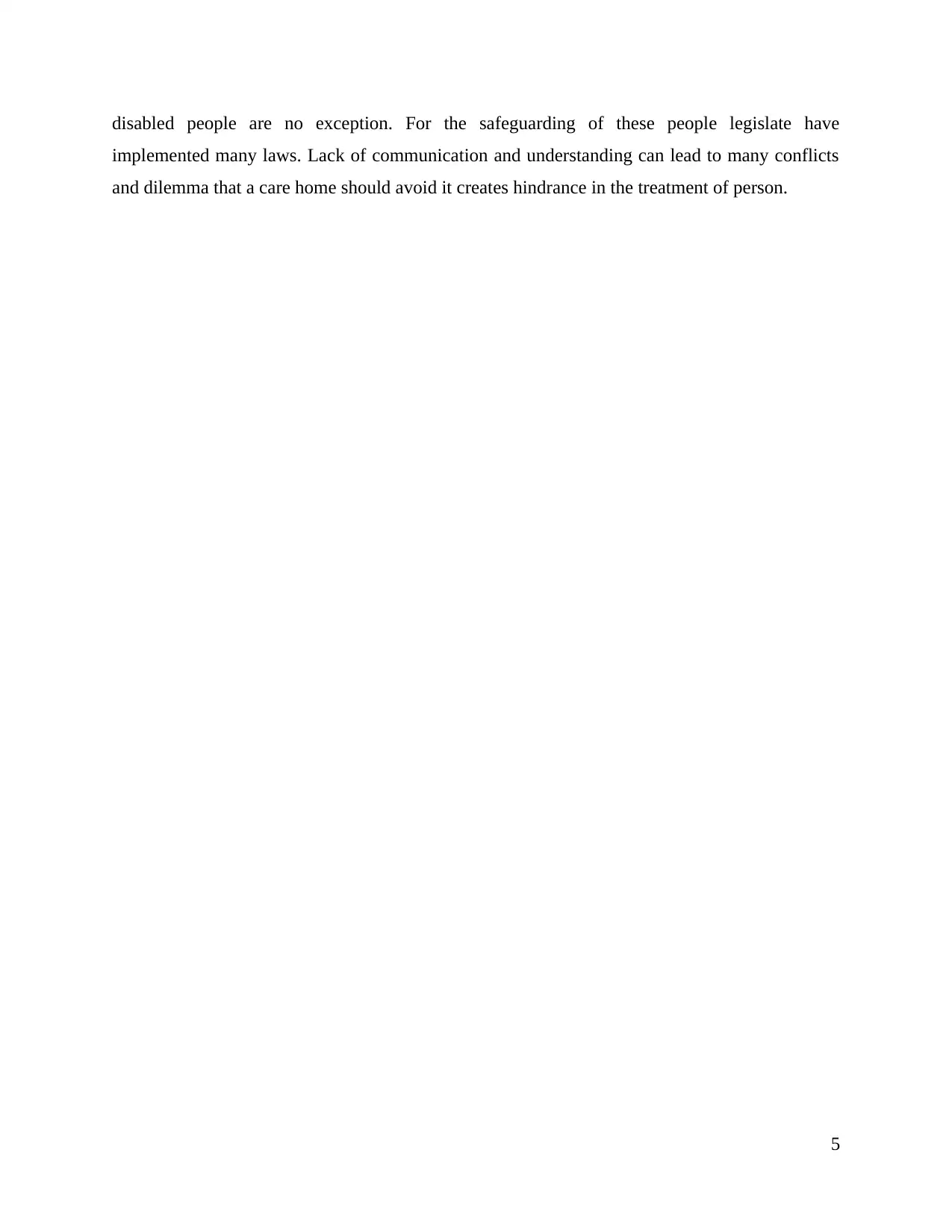
disabled people are no exception. For the safeguarding of these people legislate have
implemented many laws. Lack of communication and understanding can lead to many conflicts
and dilemma that a care home should avoid it creates hindrance in the treatment of person.
5
implemented many laws. Lack of communication and understanding can lead to many conflicts
and dilemma that a care home should avoid it creates hindrance in the treatment of person.
5
Paraphrase This Document
Need a fresh take? Get an instant paraphrase of this document with our AI Paraphraser
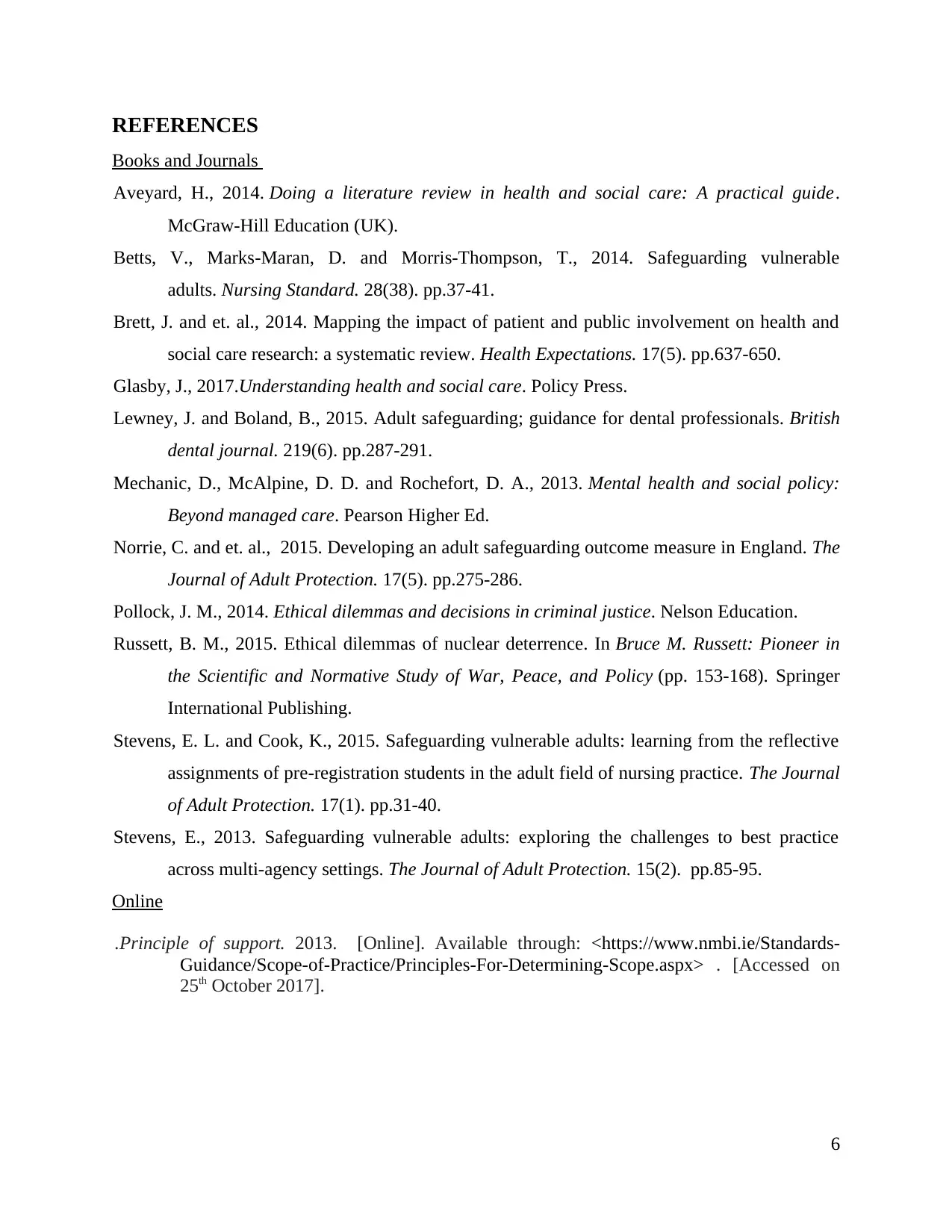
REFERENCES
Books and Journals
Aveyard, H., 2014. Doing a literature review in health and social care: A practical guide.
McGraw-Hill Education (UK).
Betts, V., Marks-Maran, D. and Morris-Thompson, T., 2014. Safeguarding vulnerable
adults. Nursing Standard. 28(38). pp.37-41.
Brett, J. and et. al., 2014. Mapping the impact of patient and public involvement on health and
social care research: a systematic review. Health Expectations. 17(5). pp.637-650.
Glasby, J., 2017.Understanding health and social care. Policy Press.
Lewney, J. and Boland, B., 2015. Adult safeguarding; guidance for dental professionals. British
dental journal. 219(6). pp.287-291.
Mechanic, D., McAlpine, D. D. and Rochefort, D. A., 2013. Mental health and social policy:
Beyond managed care. Pearson Higher Ed.
Norrie, C. and et. al., 2015. Developing an adult safeguarding outcome measure in England. The
Journal of Adult Protection. 17(5). pp.275-286.
Pollock, J. M., 2014. Ethical dilemmas and decisions in criminal justice. Nelson Education.
Russett, B. M., 2015. Ethical dilemmas of nuclear deterrence. In Bruce M. Russett: Pioneer in
the Scientific and Normative Study of War, Peace, and Policy (pp. 153-168). Springer
International Publishing.
Stevens, E. L. and Cook, K., 2015. Safeguarding vulnerable adults: learning from the reflective
assignments of pre-registration students in the adult field of nursing practice. The Journal
of Adult Protection. 17(1). pp.31-40.
Stevens, E., 2013. Safeguarding vulnerable adults: exploring the challenges to best practice
across multi-agency settings. The Journal of Adult Protection. 15(2). pp.85-95.
Online
.Principle of support. 2013. [Online]. Available through: <https://www.nmbi.ie/Standards-
Guidance/Scope-of-Practice/Principles-For-Determining-Scope.aspx> . [Accessed on
25th October 2017].
6
Books and Journals
Aveyard, H., 2014. Doing a literature review in health and social care: A practical guide.
McGraw-Hill Education (UK).
Betts, V., Marks-Maran, D. and Morris-Thompson, T., 2014. Safeguarding vulnerable
adults. Nursing Standard. 28(38). pp.37-41.
Brett, J. and et. al., 2014. Mapping the impact of patient and public involvement on health and
social care research: a systematic review. Health Expectations. 17(5). pp.637-650.
Glasby, J., 2017.Understanding health and social care. Policy Press.
Lewney, J. and Boland, B., 2015. Adult safeguarding; guidance for dental professionals. British
dental journal. 219(6). pp.287-291.
Mechanic, D., McAlpine, D. D. and Rochefort, D. A., 2013. Mental health and social policy:
Beyond managed care. Pearson Higher Ed.
Norrie, C. and et. al., 2015. Developing an adult safeguarding outcome measure in England. The
Journal of Adult Protection. 17(5). pp.275-286.
Pollock, J. M., 2014. Ethical dilemmas and decisions in criminal justice. Nelson Education.
Russett, B. M., 2015. Ethical dilemmas of nuclear deterrence. In Bruce M. Russett: Pioneer in
the Scientific and Normative Study of War, Peace, and Policy (pp. 153-168). Springer
International Publishing.
Stevens, E. L. and Cook, K., 2015. Safeguarding vulnerable adults: learning from the reflective
assignments of pre-registration students in the adult field of nursing practice. The Journal
of Adult Protection. 17(1). pp.31-40.
Stevens, E., 2013. Safeguarding vulnerable adults: exploring the challenges to best practice
across multi-agency settings. The Journal of Adult Protection. 15(2). pp.85-95.
Online
.Principle of support. 2013. [Online]. Available through: <https://www.nmbi.ie/Standards-
Guidance/Scope-of-Practice/Principles-For-Determining-Scope.aspx> . [Accessed on
25th October 2017].
6

7
1 out of 9
Related Documents
Your All-in-One AI-Powered Toolkit for Academic Success.
+13062052269
info@desklib.com
Available 24*7 on WhatsApp / Email
![[object Object]](/_next/static/media/star-bottom.7253800d.svg)
Unlock your academic potential
© 2024 | Zucol Services PVT LTD | All rights reserved.





